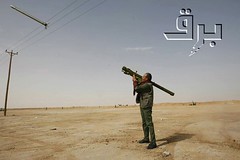 Image by شبكة برق | B.R.Q via Flickr
Image by شبكة برق | B.R.Q via FlickrAl Jazeera (which has the absolutely best coverage) reports that the “Arab Street” is not protesting and doesn’t really care. It is Qadaffi, after all – and he is hardly anyone’s favourite dictator in this region. They are outraged, for example, of the slaughter of protesters in Yemen last Friday where over 40 were killed by snipers firing into a crowd. But, they also know that Qadaffi has killed thousands and that his tanks, once inside a city, indiscriminately fire on civilians, apartment buildings and generally cause massive destruction and death. There is no comparison.
Not to beat a dead horse, but now that the initial assault is over and the Libyan air force, air defence and its command and control centers have been obliterated in 36 hours – something only, by the way, the US could do – now what? Assuming that the US now fades into the background and hands the intervention over to Europe, what is Europe going to do since one outcome may be that Qadaffi stays in power?
Although the European nations contributing to the effort include Denmark, Italy, Spain, France, Belgium, Greece, Norway and the UK, it is clear that future control will be handed to either France or the UK. The contributions of Qatar (which makes me a little nervous since I am sitting here) and the UAE are important, but the European coalition needs to engage and bring in Egypt, at the least, Algeria and perhaps Turkey (although its economic interests and Erdogan’s instincts about military intervention may make Turkey’s involvement problematic). This will become even more critical if, as may very well happen, talks are opened with Qadaffi. In that case, under no circumstances should Europe (much less the US) be seen as removing him from power.
Qadaffi may be removed by his own military at some point for self-preservation. That still leaves a divided country with a self-proclaimed government in the east which, without European firepower, would probably have been decimated this past weekend. It still has no military resources or organizational capability to cross the desert and take Sirte, much less Tripoli, so the prospect of some sort of game changer – removal of Qadaffi by supporters – is important to prevent the prolongation of what is really a civil war. If that does not happen, then Europe must enlist the Arabs into more substantial support.
From the reports of al Jazeera, it is has become abundantly clear that there are rivalries within the rebel camp that are maneuvering for power. Europe also needs to tread carefully here since Libya is tribal by nature and a slight of one group could lead to increased violence. Again, it will be necessary to draw in Libya’s neighbors to avoid internecine fights in whatever new government is formed.
Assuming Qadaffi and his family do not go down with the ship, what happens to them? Does anyone have a strategy for the improbable?

No comments:
Post a Comment